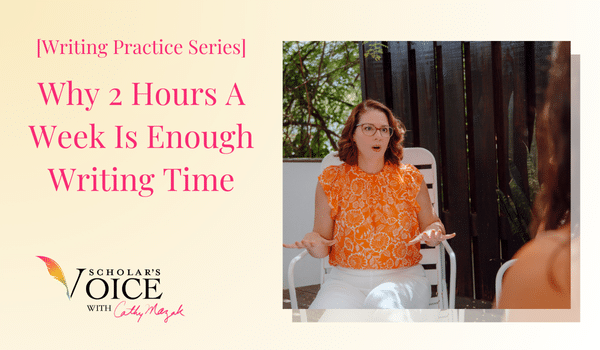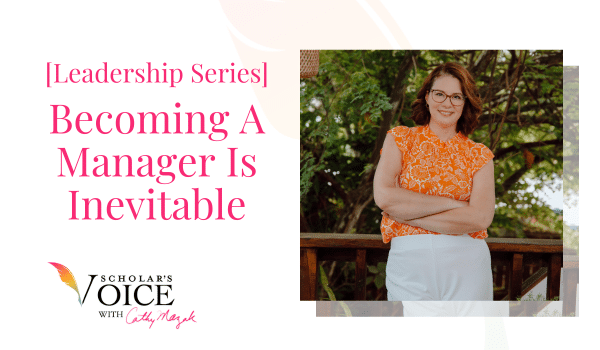[Writing Practice Series] Why 2 Hours A Week Is Enough Writing Time [RE-RELEASE 197]

If you are a frequent podcast listener, you know I advocate for writing just two hours per week to make significant progress on your writing and publications. However, many scholars struggle with the idea that such small blocks of time will make a difference.
MORE DETAILS
In today’s episode, I discuss why two hours of writing per week is not only sufficient but often preferable to trying to carve out large blocks of time. I challenge common beliefs that more time is necessary to make progress on writing projects and offer insights on how to adjust your mindset and foster a more sustainable writing practice.
If you are struggling to find time to write or feel overwhelmed by your publication pipeline, this episode is for you. Tune in for practical tips to boost your academic writing and productivity within a two-hour weekly time block.
Belief #1: You Need Big Blocks of Time to Write
Many academics believe they need a whole day free from meetings or distractions to make meaningful progress. However, holding large blocks for writing amidst your other scholarly obligations is unrealistic. When you can’t make these huge writing times work, you may not write at all. Instead, I encourage you to schedule smaller, more consistent writing sessions, such as two hours a week, to maintain momentum. Finding some time to write is always better than not writing at all.
Belief #2: All or Nothing
The mindset of “all or nothing” can hinder your writing progress. For example, some academics believe that writing every day is the only way to be productive. When they miss a writing session, they give up entirely. But writing just once a week can be enough to make progress, and, again, two hours a week is far better than not writing at all.
Belief #3: Overwhelm from Multiple Projects
Another reason academics struggle to believe that two hours of writing a week is sufficient is the overwhelming number of projects in progress. Scholars often feel paralyzed by the thought of having to work on multiple drafts or publications simultaneously, which can make it seem impossible to make real progress. Focusing on just one project and breaking it down into manageable tasks, even a small weekly commitment, like two hours, can make a significant impact.
Inside our Navigate program, each participant selects a low-hanging fruit project to begin honing their time and task management skills. Through these exercises, most finish an article within weeks instead of the months they initially estimated.
“If you close the door to other possible ways of getting writing done by thinking you need to hold the whole day open because you need all this space to write, what it equals to is no writing. Let’s agree that two hours a week is better than zero hours a week. What you’re doing currently and the way you’re thinking about writing time currently is a good idea theoretically, but it is not actually happening then that’s equal to zero hours of writing.”
“Two hours is so much better than zero hours. When you think what two hours of writing would be in a month, it would be eight hours of writing. In terms of a semester that would be thirty hours of writing.”
We’ve opened the waitlist for our next cohort of Navigate: Your Writing Roadmap®. Check out the program details and get on the waitlist here.
CONTINUE THE CONVERSATION:
- Our 12-week Navigate: Your Writing Roadmap® program helps tenure-track womxn and nonbinary professors to publish their backlog of papers so that their voice can have the impact they know is possible. Get on the waitlist here!
- Cathy’s book, Making Time to Write: How to Resist the Patriarchy and Take Control of Your Academic Career Through Writing is available in print! Learn how to build your career around your writing practice while shattering the myths of writing every day, accountability, and motivation, doing mindset work that’s going to reshape your writing,and changing academic culture one womxn and nonbinary professor at a time. Get your print copy today or order it for a friend here!
- If you would like to hear more from Cathy for free, please subscribe to the weekly newsletter, In the Pipeline, at scholarsvoice.org. It’s a newsletter that she personally writes that goes out once a week with writing and publication tips, strategies, inspiration, book reviews and more.
CONNECT WITH ME:
RELATED PODCASTS
Stay current in Academic Publishing
Subscribe to our newsletter:
In the Pipeline
writing tips, publishing trends, reading recomendations, free workshops





